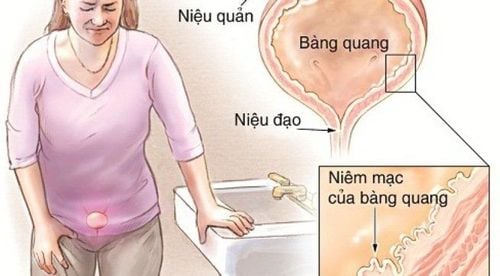This is an automatically translated article.
The article was professionally consulted by Specialist Doctor I Nguyen Hung - Department of Medical Examination & Internal Medicine - Vinmec Danang International Hospital. With over 36 years of experience in the profession, the doctor has experience in treating endocrine - diabetes and kidney diseases.Neurogenic bladder is bladder dysfunction caused by part of the nervous system that is damaged. Bladder loss of function affects the process of urinating and expelling water from the body.
1. What is neurogenic bladder disease?
The bladder is a hollow, spherical organ. This is the organ that stores and expels urine. Normally, the human urinary cycle would be retention and expulsion. The bladder will hold urine at a low pressure when the two muscles relax together with the elasticity of the bladder wall will trigger the bladder to relax under that low pressure. At the same time, the muscles will tighten enough to prevent urine from leaking out.When the brain sends a signal that it wants to urinate, the bladder will proceed to excrete urine by relaxing the sphincter muscles. If one of these two activities is abnormal, it will lead to bladder dysfunction.
Neurogenic bladder is a disease that causes loss of bladder function due to damage to the nervous system. Patients with neurogenic bladder will have an underactive bladder that cannot contract and relax rhythmically to hold and expel urine. Or conversely, the bladder is overactive, often contracting, not coordinating with other bladder organs.

2. Causes of neurogenic bladder disease
There are many causes of neurogenic bladder disease, including:Birth defects that directly affect the spinal cord such as: spina bifida, sacral aplasia, spinal abnormalities Tumors in the pelvis or tumor in the spinal cord; Trauma damages the spinal cord. Diseases affecting the nervous system such as: stroke, spine surgery, Parkinson's disease Complications of other diseases such as diabetes, syphilis, polio...
3. Signs of neurogenic bladder disease
Symptoms of neurogenic bladder disease include:Loss of control over urination, urinary incontinence. Drip urine Difficulty Urinary retention Urinary retention for too long can cause inability to contract bladder muscles, reduce coordination between bladder muscles and urethral sphincters Urinary tract infections Urinary retention. When the bladder muscle relaxes and opens to store urine, the inability to coordinate the relaxation of the urethral sphincter and bladder muscle contractions or the inability to relax the urethral sphincter leads to increased bladder pressure. optical. Increased bladder pressure is associated with an increased risk of urinary tract infections and pyelonephritis, kidney damage. Patients are likely to have urinary stones due to urinary infection and stagnation.
When urine is strained from the bladder, it leads to vesicoureteral reflux. This phenomenon will increase the risk of severe kidney infection because contaminated urine from the bladder comes into contact with the kidneys causing pyelonephritis.

4. How is neurogenic bladder disease diagnosed?
When you see signs of neurogenic bladder disease or suspect that you have a disease, you should go to the hospital for examination as soon as possible. The patient will be assigned to perform necessary tests and some techniques to diagnose neurogenic bladder such as:Blood and urine tests Measure residual urine volume Measure bladder pressure (Cistometrogram) Endoscopy bladder X-ray of the urinary tract, ultrasound of the urinary system , computed tomography (CT) scan, magnetic resonance imaging (MRI) to determine brain activity. Neurogenic bladder greatly affects the quality of life of patients, including inconvenience and discomfort due to dysfunctional urination. In order to properly identify the disease condition and treat neurogenic bladder completely, soon return to normal life, patients should see a doctor at reputable large hospitals.
Vinmec International General Hospital is the address for examination, treatment and prevention of diseases. When performing the examination process at Vinmec, customers will be welcomed and used modern facilities and equipment along with perfect medical services under the guidance and advice of experts. Good doctors, well-trained both at home and abroad.
Please dial HOTLINE for more information or register for an appointment HERE. Download MyVinmec app to make appointments faster and to manage your bookings easily.














